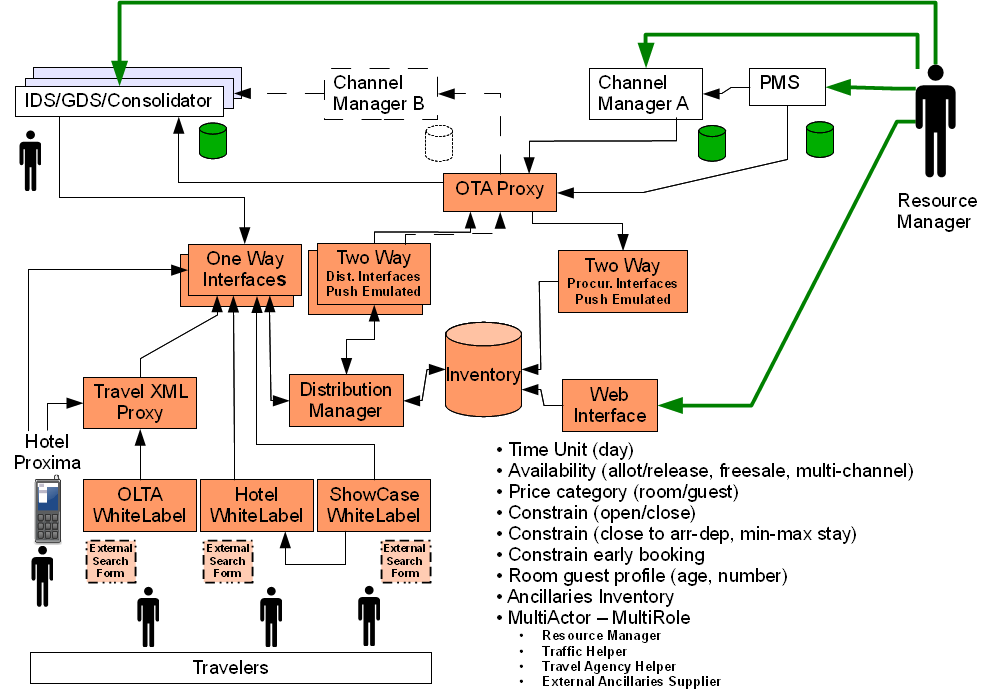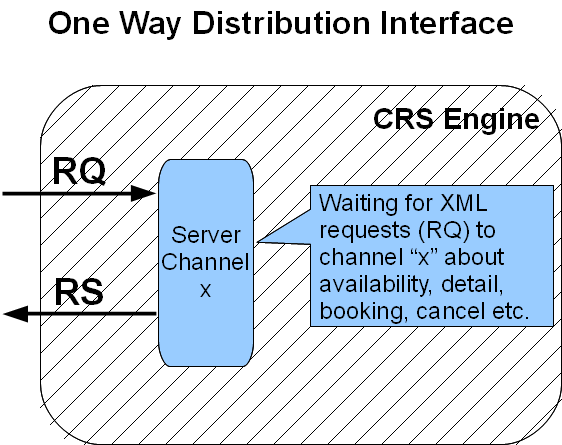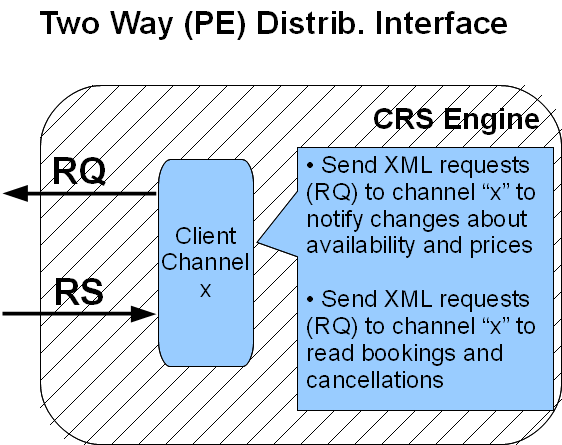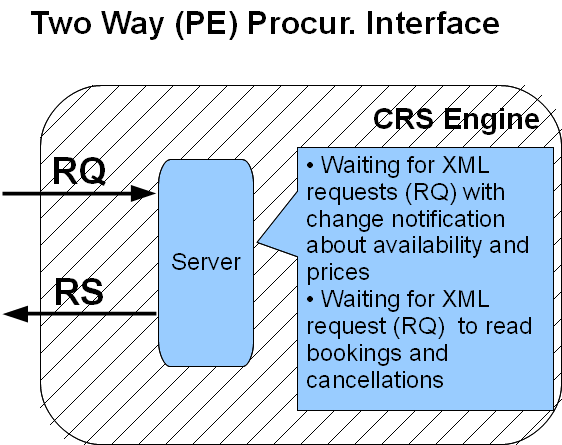Central Reservation System Engine
The application realizes a platform for the management of receptive structures (Accomodation) that allows for all aspects of the "Online Booking" and of the multi-channel distribution (Channel Manager) to be managed by a limited number of structures (already tested with more than 100'000 Hotels).
The platform also allows each tourism structure to manage:
- Accomodation Facility information like: addresses, textual descriptions, image galleries, complex services (hotel services).
- Receptive Element information like: textual descriptions, image galleries, receptive element services (Room services).
- Dynamic information which includes availability and price.
The information contained in the Inventory, may be inserted/added through manual actions (Human Interface) carried out on the backoffice web interface, thanks both to actions executed by other applications (Machine Interface) and XML packets with OTA syntax. A couple of examples of the use of these capabilities, are the Travel XML Proxy and the HotelWhiteLabel.

The platform may distribute receptive products of single structures Online thanks to a webservice interface with XML OTA syntax, both in ONE WAY (Provider like) and TWO WAY Push Emulated mode (Channel Manager like).
The platform is equiped with One Way XML Distribution Interface and therefore:
- "Providers" and "Tour Operators" may query the interface, in webservices mode with XML OTA syntax.
- it is also usable for realizing Online Booking functions internal to the Hotel portal, due to a direct use by the webservices call portal, which exists to build in an autonomous fasion the Online Booking function through the use of a HotelWhiteLabel IFrame element.

The platform also has a Two Way Push Emulated XML Distribution Interface and therfore:
- can distribute the receptive product on IDS channels that use the Two Way method (expedia.com, venere.com, hotels.com, hotel.de, transhotel.com, hotelbeds.com ,itwg.com ,HRS.com)

The platform is equiped with Two Way Push Emulated XML Procurement Interface, and therfore is usable to verify availabilities and prices from:
- a channel manager
- a PMS (Property Management System) namely the tourist resource management.

The platform is capable of a RIA type Graphic Interface for the administrative management (BackOffice) and allows an easy and intuitive operations:
- Platform Management
- Internal DB (geographic classifications, payment methods etc.)
- Tourist Accomodation Profiling
- Multi Level Entity/Domain Management with the following hierarchical structure :
- Platform (one entity)
- Distributor (1-N entities)
- Chain (0-N entities)
- Reception Facilities (1-N entities)
- Chain (0-N entities)
- Distributor (1-N entities)
- Platform (one entity)
- Account Management every account is associable to a group of privileges and receptive resources, therfore given the privileges, the account may or may not make use of the management and visualization interfaces for receptive facilities. Based on the privileges at hand, you may see changes in, for example, the set of visualized tabs from the web interface, and also the access flow. For example if a user with privileges for the visualization of just one receptive facility, the user is directly shown the racaptive facility without bothering with masks for the Receptive facility selection (that are, for this case, useless to the user).
- Booking Managment for each booking, all the economic conditions used during the sale are saved and the Booking interface allows for management and visualization of eventual developments (noshow, cancellation etc.)
- Receptive facilities management
- Statistics
- Hotel Description
- Room Description
- Position
- Address and Phone number
- Structural Services
- Overall operations
- Children's age
- use of " Daily Base Price" mode (room/person)
- Basic Dynamic Data
- Rooms
- Daily Availability (per channel)
- Daily Prices (per channel)
- Product (commercial conditions)
- Cancellations
- Rooms
- Ancillary Services (Extra)
- Statistics
Implementation Principles
Ergonomics - Essential Data Entry
During the design of the CRSEngine, particular attention was dedicated to the implementation of mechanisms that allow "Type once" info. shared/divided among various elements, not excluding who desires to operate without sharing.
The platform allows for receptive resource management, adaptable to the level of complexity desired, covering all management from the simplest to the more complex, requiring only the data entry for the level of complexity selected. Therefore the platform is capable of following and adapting to the complexity requirements of the manager.
In particular, given that e-commerce, in the accommodation sector, has as the object of the transaction placing guests in units called (in abbreviated form) "Rooms" for specific temporal periods , attentions have focalized on the "Room" element and the "RoomCategory" which is the element that allows a single description for more rooms that have the same receptive capabilities and allows for the availability to be managed as a number of rooms which are part of the same "RoomCategory".
To reduce the typing of information where possible, other than the creation/modification comand for an "element", there also exists a comand for duplication that allows for new elements to be created, starting from another existing element, replicating all non unique fields.
Ergonomics - Repentance Management
Every form of creation and/or modification of data, permits us to save or cancel the modification put into effect on the data, through commands found on the control panel, indicated by the "Save" and "Cancel" icons.
In case the selected comand involves an elimination, before it's execution the user will be prompted.
Menu Ergonomics
The backoffice application is organized through a multilevel menu system, set horizontally thanks to tabs associated to forms and reports.
The image below shows the first level menu selected "Hotel" and the second level "Rooms" that leads to the visualization of all the configured room reports.
Main Action Icons
For each of the rooms in the report shown in the image above, the icons on the left side show the possible actions on the corrispondent room.
Ancillary Services (Extra)
The extras can be divided into the following macro categories:
- Offline goods and services that do not require an online availabilty check and therefore do not require interoperability between the CRSEngine and an external application to manage the availability of these goods.
- Online goods and service that require an availability check to be sold with the room.
The CRSEngine allows for the direct management on "Offline" extras, allowing:
- the traveller during the booking to:
- define the daily activities
- the manager during the configuration of extras to:
- define the contraints on daily deliverability (arrival date, departure date, number of days stay).
- define the inclusion/esclusion of the room price
- in case of inclusion ("advertised price" and "non advertised price").
- define the inclusion/esclusion price of the room.
- define whether compulsory/optional.
- define if the payment is to be done on booking or on arrival (at hotel).
- define the type of recurrence (per person, per night, per person-night, per stay, per use).
- differenciate the adult/child prices.
- define the time period in which it is available and on which days of the week.
- define whether it is a globally valid extra (includable in every other commercial offer) or of product (includable only in commercial offers that provide it)
Obviously not all combinations are resonable for example:
- if the extra is "Included" it cannot be "Optional" and neither payable on arrival (in hotel).
- if the extra is "Included" but the price is not shown and the extra is external, then it is under care of who manages the residential resource price untill the potential cost of the extra hasn't been recovered, so as to show only the "total" of the selected combination.
The CRSEngine is capable of managing even the extras for which an "Online" availability check is necessary, and to do this we use the appropriate Travel XML Proxy (Flight, Car, etc.)
Packets
The presence of "Min/Max Stay" within the product, and the connectivity between hotel/product with the "ancillary services" allows for the residencial resource manager to configure and completely manage packets (of which examples can be found in the Hotel WhiteLabel).
Interfaces - Channels
The platform was designed and built so the iteration with content may be actuated through different interfaces, some of "Human" type like the backoffice interface for example, and other types of "Machine" type like supply and distribution webservices.
Every interface has a unique access URL (like for example the backoffice interface attainable at the url http://backoffice.crsengine.com or like the direct "online" distribution interface used by HotelWhiteLabel)
For each receptive resource the platform manager may authorize the use of one or more distribution channels and one supply channel, and the manager decides whether to "activate" or not an "authorized" channel through the interface.
Every interface, other than being used by authorized receptive resources , it is also used by external entities to access pubblished information by the authorized receptive resources.
Access to the distribution or supply channel by external entities takes place according to which credentials are associated with the permissions to access both the channel and the subset of configured receptive resources.
The system therefore allows for specialized channels (custom) and specialized credentials (custom) to be created.
The receptive resource manager may:
- selectively choose which RoomCategory to set on each channel and for each of these, define which name that RoomCategory will be known by ( this enables us to define, for example, which code is used by Expedia)
- selectively choose which "product" (RatePlan) to use on each channel and for each of these, define which name the correspondent RatePlan will be known by.
Enabled Accounts (Authentication of Authorizations)
The platform is equipped with a system able to condition access and manipulability of the information related to the object oriented structuring of the project, and then organized on the basis of:
- identification of the Account (User alias) presently authenticable internally to the application, but predisposed for external authentication.
- identification of "Macro Objects" (hotels, territorial associations, business chains, distribution/supply channels)
- identification on these Macro Objects of actions to be conditioned, through associations to permissions (necessary) to realize them.
The authorization management on the platform enables associations to every user and for each interface a groups of assigned permissions, and one or more "Macro Objects" on which to apply them.
Supported Browsers
| Internet Explorer (IE6, IE7, IE8, IE9), all compatibility modes | |
|
Mozilla Firefox (FF3.6, FF4, FF5, FF6) |
|
|
Opera (O9, O9.5, O10, O10.5, O11, O11.5) |
|
|
Google Chrome (CH3 - CH12) |
Minimum use
This platform allows for a more progressive approach and does not require the manager to set all parameters from the beginning, enabling the various functionalities only when necessary, in this way it is possible to render a structure operative setting only:
- hotel code
- method for managing sums (per room/per person)
- defining a single product (set of marketing rules with a single cancellation policy)
- defining one single room category
- establishing only one availability for the existing room category (freesale without allotment) on a direct channel
- defining only one valid price, on the same direct channel
and so, without defining any other statistics relative to the receptive structure or relative to the rooom.
Service delivery Modes
The platform may be provided in service mode and in this case it is resposibility of:
Infotech
- Hardware
- Connectivity
- System Management (Database O.S., Application Container)
- Application Management (second level Help Desk)
Receptive Structure Operator - Distributor:
- Agreements with Distribution Providers, meaning Wholesales and/or IDSs(Expedia, Booking, etc)
- Agreements with Providers for External Extras (Flights, Cars, Insurance, etc)
Other integrations are evaluated on project:
- Integration with the Tourist Operator Management interface, following different syntax and/or modes than those implemented.


